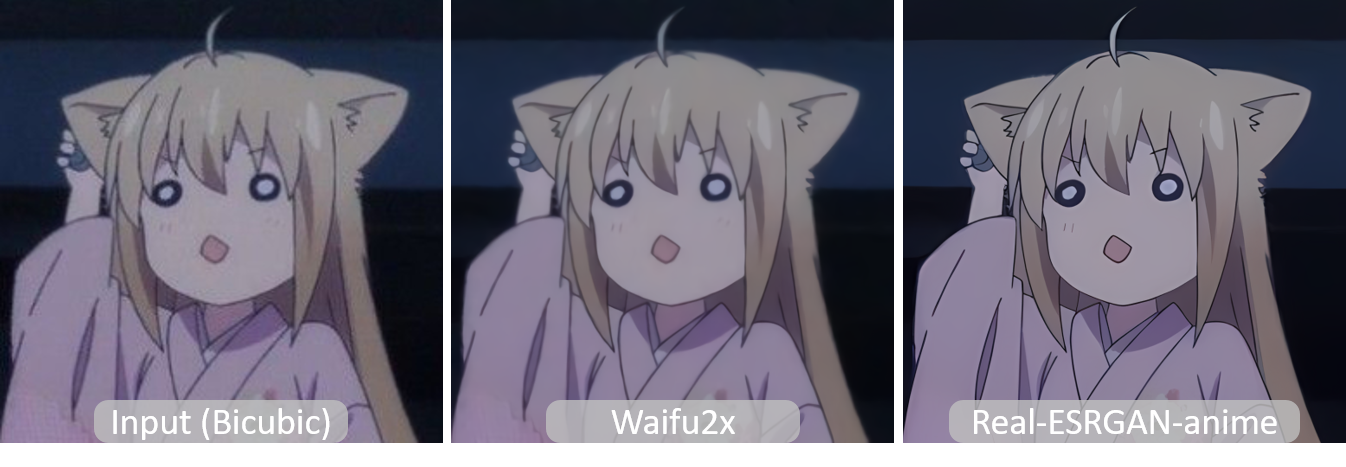This project is the ncnn implementation of Real-ESRGAN. Real-ESRGAN ncnn Vulkan heavily borrows from realsr-ncnn-vulkan. Many thanks to nihui, ncnn and realsr-ncnn-vulkan 😁
Real-ESRGAN aims at developing Practical Algorithms for General Image Restoration. We also optimize it for anime images.
If Real-ESRGAN is helpful in your photos/projects, please help to ⭐ this repo or recommend it to your friends. Thanks😊
Other recommended projects:
[Paper] [Project Page] [Demo]
Xintao Wang, Liangbin Xie, Chao Dong, Ying Shan
Tencent ARC Lab; Shenzhen Institutes of Advanced Technology, Chinese Academy of Sciences
- Support further cheap arbitrary resize (e.g., bicubic, bilinear) for the model outputs
- Bug: Some PCs will output black images
- Add the guidance for ncnn model conversion
- Support face restoration - GFPGAN
realesrgan-ncnn-vulkan.exe -i input.jpg -o output.png -n realesr-animevideov3 -s 2Usage: realesrgan-ncnn-vulkan.exe -i infile -o outfile [options]...
-h show this help"
-i input-path input image path (jpg/png/webp) or directory"
-o output-path output image path (jpg/png/webp) or directory"
-s scale upscale ratio (can be 2, 3, 4. default=4)"
-t tile-size tile size (>=32/0=auto, default=0) can be 0,0,0 for multi-gpu"
-m model-path folder path to the pre-trained models. default=models"
-n model-name model name (default=realesr-animevideov3, can be realesr-animevideov3 | realesrgan-x4plus | realesrgan-x4plus-anime | realesrnet-x4plus)"
-g gpu-id gpu device to use (default=auto) can be 0,1,2 for multi-gpu"
-j load:proc:save thread count for load/proc/save (default=1:2:2) can be 1:2,2,2:2 for multi-gpu"
-x enable tta mode"
-f format output image format (jpg/png/webp, default=ext/png)"
-v verbose output"input-pathandoutput-pathaccept either file path or directory pathscale= scale leveltile-size= tile size, use smaller value to reduce GPU memory usage, default selects automaticallyload:proc:save= thread count for the three stages (image decoding + model upscaling + image encoding), using larger values may increase GPU usage and consume more GPU memory. You can tune this configuration with "4:4:4" for many small-size images, and "2:2:2" for large-size images. The default setting usually works fine for most situations. If you find that your GPU is hungry, try increasing thread count to achieve faster processing.format= the format of the image to be output, png is better supported, however webp generally yields smaller file sizes, both are losslessly encoded
If you encounter crash or error, try to upgrade your GPU driver
- Intel: https://downloadcenter.intel.com/product/80939/Graphics-Drivers
- AMD: https://www.amd.com/en/support
- NVIDIA: https://www.nvidia.com/Download/index.aspx
- https://github.com/Tencent/ncnn for fast neural network inference on ALL PLATFORMS
- https://github.com/webmproject/libwebp for encoding and decoding Webp images on ALL PLATFORMS
- https://github.com/nothings/stb for decoding and encoding image on Linux / MacOS
- https://github.com/tronkko/dirent for listing files in directory on Windows
@InProceedings{wang2021realesrgan,
author = {Xintao Wang and Liangbin Xie and Chao Dong and Ying Shan},
title = {Real-ESRGAN: Training Real-World Blind Super-Resolution with Pure Synthetic Data},
booktitle = {International Conference on Computer Vision Workshops (ICCVW)},
date = {2021}
}
If you have any question, please email [email protected] or [email protected].




